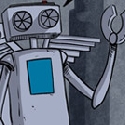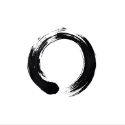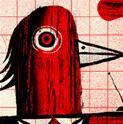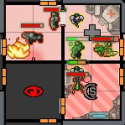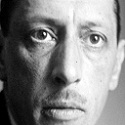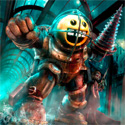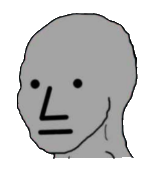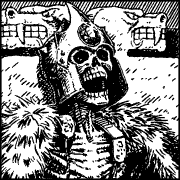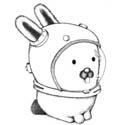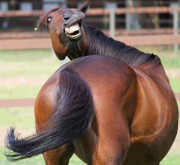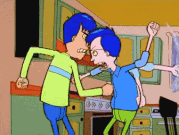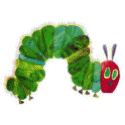|
Xik posted:Can you explain? Is it completely different to the other novels in the series? If it's going to ruin Culture for me maybe I'll skip that one Nah, give it a read. If you don't like it, keep going in the series. I just found it boring.
|
|
|
|

|
| # ? May 15, 2024 11:56 |
|
Only one book last month, because I was reading two and didn't really like either of them all that much, but I'm on my second of the month for June already and Goodreads says I'm back on track for my challenge, finally. 12. Chris Wooding - Retribution Falls - Good lord did I hate this book. The story itself is passable if derivative, but the writing is abominable. 12/30 As always, more detailed reviews on my Goodreads.
|
|
|
|
thespaceinvader posted:Next is a collection of short stories by Peter F Hamilton, but I can't remember the title. I think it's Manhattan in Reverse but I'll confirm shortly. 37: Manhattan in Reverse by Peter F Hamilton. Very good set of short stories, fascinating very interesting, lots of thought-provoking stories, and great to have Hamilton's imagination in short stories, rather than giant doorstoppers. 38: The Alchemist by Paolo Bacigalupi. I really like Bacigalupi's work and this is no exception, but I'm slightly disappointed to find it's only 60 pages long. Next is The Excecutioness, set in the same world but a different author whose name I forget. Humble Ebook Bundle is good times.
|
|
|
|
Since it's not on my kindle, I forgot 11. Worm by Wildbow. Worm is pretty good and extremely long. It has some significant problems on account of being a first draft and the prose has the unfortunate tendency to feel like exposition even when it's not, but it was still totally worth the time. Wildbow gives his characters great powers and then lets them be extraordinarily clever about using them. This removes two very common sources of conflict and challenge, but things are always so dire for pretty much everyone that characters are pulling through by the skin of their teeth at best. This hurts the pacing a little, but as a strategy for serial fiction, it's pretty effective. Wittgen fucked around with this message at 12:21 on Dec 29, 2014 |
|
|
|
CestMoi posted:I think I'll start my reading challenge from basically the half way mark and so I will set myself a target of 36 books, or around one every 5 days. Been in Italy for a week, but got a lot of reading in by the pool so I'm actually now a little ahead of schedule with; 2) The Man WHo was Thursday, A Nightmare by G. K. Chesterton - Really good, lots about it to think about like why they were all wearing those weird clothese at the end? Seemed kind of mystical/religious probably. 3) The Man who Was Thursday, A Nightmare by G. K. Chesterton - Not bad, seems a little implausible that the 6 people who would be most recruitable and simultaneously the most firebrandy would be so easy to find and trick into going undercover. There's only so far I can suspend my disbelief and the worst parts of this book bsaically broke it. When it was good, it was very good though, you can see why it's so highly regarded.
|
|
|
|
Ezzum posted:May: (30/36) June: (35/36) 31. Catch-22 by Joseph Heller - A masterpiece. I'm so glad I read this because literally everything about it is genius. The comedy is gold. I've heard some people accuse the humor in the book of being overly intellectual, but honestly I thought it was legitimately laugh-out-loud funny, like Douglas Adams. The sad parts are absolutely heartbreaking. The concepts are brilliant (if you can create an entire subset of logic with a work of fiction, you know you've stumbled on something gold). The writing style is unique and incredibly fun to read. The characters are some of the most interesting and memorable I've ever encountered; plus, they have some of the coolest names I've encountered since I watched Gungrave (Milo Mindbender? Major Major Major Major? Yossarian?). Basically I loved it. You go Joseph Heller. 32. You Are One Of Them by Elliott Holt - A pretty good book. My studying Russian history and culture last year helped a lot, and it purred with the joy of recognition. Not just cultural references, though. I felt like I saw a lot of people I know in this book, as well as a bit of myself. The characters, particularly the protagonist, are very nuanced and realistic-- and that last page! Agh, that was perfect. It did drag a bit at spots/get repetitive at points, but I am overall glad I read it. 33. The Old Man And The Sea by Ernest Hemingway - Probably the most Hemingway of Hemingway's books. I mean, it's all there, aside from maybe bullfighting. Cuba, fishing, the ultra-masculinity, etc. Honestly though I felt it was pretty weak compared to his other works. While almost all of Hemingway's works seek in some way to redefine heroism, courage, valor, etc. the majority of them have some sort of nuance about it. For example The Sun Also Rises sought to explain what heroism meant to the new generation of people coming out of WWI and how their experiences had affected their perception. The Old Man by contrast doesn't seem to say much about heroism other than that it exists. It also drags a lot at times which is really inexcusable for such a short book. There were some great moments but overall I don't know if it was worth the read. 34. When We Were Orphans by Kazuo Ishiguro - Been a long time since I've read Ishiguro, and fittingly, the taste is nostalgic. Ishiguro has always been a master at revelation, slowly and skilfully unweaving the webs his characters weave for themselves, and this is no exception. Overall, though, I'm not sure if this narrative really suits his talents. It's too dramatic, too much actually happens, and his cautious, measured tone doesn't really fit what's going on a lot of the time. I think it's probably his weakest work, but even poo poo from Ishiguro is better than 99% of what anyone else could write, so... 35. Fires On The Plain by Shohei Ooka - Oh my God, the most soul-crushing, depressing, vomit-inducing book of all time. I don't want to get too much into it because there are major spoilers, but... Ungh. Not since A Long Way Gone have I seen such an awful portrayal of war in a book, and without even the solace of a happy ending. Good book, but would not recommend for the faint of heart. 36. The Lathe Of Heaven by Ursula K. Le Guin - Really good until the end, where I feel like it kinda started to drag. The first section was absolutely mind-blowing. Kinda reminded me of a Satoshi Kon movie in the way it successfully weaved together dreams and reality. Overall the concept of this book is great, but a straggling last quarter keeps me from really loving it like The Dispossessed. Ezzum fucked around with this message at 16:50 on Jun 30, 2014 |
|
|
|
thespaceinvader posted:
39: The Excecutionessby Tobias S Buckell. Very good. I really like this world, and I like the characters both Bacigalupi and Buckell have brought me - and it makes me want to find more Buckell. I'm just disappointed that both are only 60-page novellas. I wanted some full-length fiction in this world, espeially by Bacigalupi, whose work I REALLY like. 40: The Sword & Sorcery Anthology introduced by David Drake. Thus far I've read a Conan story, which was interesting and makes me want to finally get round to reading Howard.
|
|
|
|
Roydrowsy posted:The school year ended this week, which meant no more grading papers or planning lessons, so I knocked out quite a few books fairly quickly. 68. The Keeper: Sarah Langan It started out interesting enough, but by the end it was really uninteresting and dull. This story about a small town in Maine falling under the weight of its own secrets and corrpution has been done by much better writers. 69. The Troop: Nick Cutter This book was so much fun to read. Delightfully creepy. The sort of thing that will make your skin crawl, and you'll start scratching as you read it. An excellent horror novel that doesn't take anything too far. Just good, creepy fun. 70. The Handmaid's Tale: Margaret Atwood. I really wanted to like this, and perhaps I would have enjoyed it more had I not listened to it as an audiobook. It was alright, it just wasn't that great. Stories about people treating women like poo poo because of religious values is sorta old news. 71. Everything Is Perfect When You're A Liar: Kelly Oxford Another bloggist memoir. She should probably just stick to blogs. The stories are mildly amusing, but the book has nothing holding it together. I think I'm done with memoirs for awhile. 72. Pressure by Jeff Strand Strand's books are super-cheap for the Kindle right now. Pressure was my first and it was fantastic. It's dark and grim, and it is a little messed up, but you never really feel dirty. It's also not the least bit comedic, which is how Strand is usually perceieved. I really nasty little book for somebody looking for something with bite. 73. Red Rabbit by Tom Clancy The first 100 to 150 pages is pure agony. It's so dry and dull, but as the plot comes together, it's actually rather intersting. What I appreciate about Clancy is that he makes an effort to at least make things feel real. I don't know much about how intelligence agencies function, but with Clancy at least you can say, maybe its like this. 74. Mr. Mrecedes by Stephen King As a mystery novel, this book is a lot of fun. The plot, the characters, all of that is really entertaining. When viewed in the light of "A Stephen King Novel" I can see where some people might find it lacking. It's not a game changer, it isn't one people will rank in their top ten, but I enjoyed every minute of it.
|
|
|
|
1. NOS4A2, by Joe Hill 2. MaddAddam, by Margaret Atwood 3. Galveston, by Nic Pizzolatto 4. The Unwinding: An Inner History of the New America, by George Packer. 5. The Story of the Stone, by Barry Hughart 6. Lost Girls: An Unsolved American Mystery, by Robert Kolker. 7. Annihilation, by Jeff VanderMeer 8. Authority, by Jeff VanderMeer 9. Under the Banner of Heaven, by Jon Krakauer. Under the Banner of Heaven is a drat good read if you're interested in the totally batshit history of the Mormon religion. Krakauer uses a murder of a mother and her infant daughter by two Mormon "fundamentalist" brothers to tell the whole story of the religion's genesis and the reasons behind the western migration of the Latter Day Saints. There's so much there that I didn't know...much of it pretty horrifying, especially the history of the Mountain Meadows Massacre, in which the Mormons under Brigham Young teamed up with Paiutes they had deceived and slaughtered a huge migration train with a large head of cattle and hundreds of horses. Where the book suffers is when Krakauer takes us on little detours of crazyville to tell the stories of abuse, pedophilia and brainwashing happening in isolated communities that practice polygamous offshoots of mainstream Mormonism. In these chapters it becomes extremely hard to tell who's who after a while because the geneologies of these extended, multi-wife families are mind-boggling. I put this book up there close to Going Clear as an essential work on America's homegrown, utterly hosed-up religions. I'm on to R. Scott Bakker's The Darkness that Comes Before, and wondering what the holy hell I'm reading.
|
|
|
|
CestMoi posted:Been in Italy for a week, but got a lot of reading in by the pool so I'm actually now a little ahead of schedule with; Am I missing something? You read the same book three times over?
|
|
|
|
Antti posted:Am I missing something? You read the same book three times over? Please do not be a troll and criticise other's reading challenge.
|
|
|
|
Roydrowsy posted:
How was the ending? My mother still reads him religiously and said the book was okay, but that he "once again" cocks up the finish.
|
|
|
|
CestMoi posted:Been in Italy for a week, but got a lot of reading in by the pool so I'm actually now a little ahead of schedule with; 4) The Man Who Was "Thursday", A Nightmare: by G. K. Chesterton - Didn't expect smething so close to a thriller from a book written in the 1800s. Leaves a lot of questions unanswered but overall a good read, I'd certainly recommend it, particularly since it's only 150 pages.
|
|
|
|
May Overall: 35/70 Non-fiction: 7/20 Lifetime Reading List: 2/10 New Female Authors: 5/12 Non-Europe/USA countries: 2/5 Gravity's Rainbow: 0/1 28. The Golem and the Jinni by Helene Wecker This was really great and clearly extremely well researched. It would have worked just as well as a story about being an immigrant in turn-of-last-century New York, but blending it with the mythology of each culture allowed it to explore themes about freedom, servitude, the nature of the soul, as well as the different cultural values at play. I was very impressed, and I am looking forward to seeing what she writes next. 29. Feed by M.T. Anderson This was another pleasant surprise. I knew it was YA dystopian novel and was just hoping for something light and hopefully not too heavy handed, but this turned out to actually be really interesting. The "writing like an obnoxious teenager" gimmick was actually fine since it was done more as a parody, and there was a little more depth there outside of the really obvious "corporations are bad and are wrecking everything" core theme. 30. Their Fate Is Our Fate: How Birds Foretell Threats to Our Health and Our World by Peter Doherty Good although I expected it to be more focused on climate change and how this was affecting bird populations. That was a small aspect but it was mostly about how birds transmit and predict diseases, and even then the focus was more on the history of using birds in medical research. It was also unfortunately a little dry, although not as bad as some popular science stuff I have read. So interesting, just not what I expected. 31. The Sheltering Sky by Paul Bowles This was depressing as all hell. It was certainly compelling and well written since I blazed through it and thought about it for long time afterwards. I am not sure overall how I felt about it since I don't think I was really in a good mindset at the time to read something so bleak. 32. Monstress by Lysley Tenorio I just bought this blind off a Kindle Daily Deal and it turned out to be pretty solid. It also luckily fit in with what I am going for with my reading challenge (trying to read more non-white American perspectives) since it is mostly about Filipino-American communities living in/emigrating into California. The title story was great but my favorite was The View from Culion about a leper colony in the Philippines. 33. Inverted World by Christopher Priest This had a compelling hook but was ultimately disappointing since it felt like the author was way more focused on building the intricate sci-fi setting rather than exploring the actual consequences of it. It is ostensibly about a city called Earth that is moving on tracks, where time is measure in miles and a large aspect of life is keeping the city moving and functioning. From there the main character explores the world outside the city and the secrets surrounding it, which ultimately leads to a twist which is pretty cliche and isn't really followed up on. It definitely had the appropriate ideas and themes for good speculative sci-fi but just didn't really have the follow through. 34. Things Fall Apart by Chinua Achebe This was recommended to me in the Books that aren't awful MEGATHREAD (No genre fic). It is about life in an African tribe leading up to British Colonialism and the arrival of Christian Missionaries, and is just heartbreaking and fantastic. I am probably not qualified to comment on it much otherwise, but I was very moved and would strongly recommend. 35. Who Wrote the Bible? by Richard Elliott Friedman This focuses mostly on the Old Testament and especially the first five books (the pentateuch) of the Bible. I was a little disappointed he didn't explore other areas like the New Testament and especially Revelations which has always been a favorite for how abstract and symbolic it obviously is. However, with the depth with which he explores the books he does cover, I can understand why he only focused on that specific part. I grew up Catholic and had 12 years of classes in school studying this stuff, and obviously a lot of modern society has been significantly impacted by Christianity, so it was very interesting and humbling reading about how a lot of these stories which shape the religion were created and built upon by various authors/factions over centuries. -- This was my May synopsis, it just took me several weeks to go back and write it. It was a pretty productive month, and I finally started tackling aspects of my goal which I was really looking forward to, like reading more books from foreign perspectives that I wasn't accustomed to. I need to play catch-up a bit with some of my other challenges (like non-fic and lifetime reading), but I am very happy with what I have done so far.
|
|
|
|
CestMoi posted:4) The Man Who Was "Thursday", A Nightmare: by G. K. Chesterton - Didn't expect smething so close to a thriller from a book written in the 1800s. Leaves a lot of questions unanswered but overall a good read, I'd certainly recommend it, particularly since it's only 150 pages. Might I give you a recommendation? Based on your list so far I think you'd really enjoy reading the audiobook of The Man Who Was Thursday: A Nightmare by G.K. Chesterton, as read by Ron Keith on audible.com. It shares a lot of themes with the books already on your list. My List: 21-24. Swords and Deviltry, Swords Against Death, Swords in the Mist, and Swords Against Wizardry by Fritz Leiber are collections of short stories and tales written between 1938 and 1988. They're fantastic, uncynical and earnest adventure stories with fantasy protagonists who act like real human beings (albeit larger than life ones). 25. Authority by Jeff Vandermeer is the second part of his current creepy and weird series. This one had a different style to it, but I like it as much as I did the first one. The feeling I get from Vandermeer's books is a feeling I can get nowhere else. 26. Skin Game by Jim Butcher was, as expected, another action packed Dresden novel. Pretty great, though I wonder how much of my enjoyment is propped up by the vast amount of previously established lore holding the series aloft. 27. The Crimson Campaign by Brain McClellan. I really enjoyed his first novel, and I liked this one even more. Gritty and exciting, with some pretty nifty magic poo poo flying around with all the musketballs. 28. The Severed Streets by Paul Cornell was interesting. It took me some time to get into it, but I enjoyed it a lot by the end. This might be the most British book I've ever read. Paul's occult london is pretty hosed up, and Neil Gaiman is a character in it. That's just crazy. For my next book, I think I might read The Man Who Was Thursday: A Nightmare by G.K. Chesterton. I've heard some pretty good things, but need to figure out which version to pick up.
|
|
|
|
Argali posted:How was the ending? My mother still reads him religiously and said the book was okay, but that he "once again" cocks up the finish. it was alright, but nothing really special. A little silly, but it was at least satisfying. Again, in terms of mystery/thriller genre the bad guy gets caught and life more or less goes on. For the most part, it holds pretty firm to genre conventions with some king-isms tossed.
|
|
|
|
1. NOS4A2, by Joe Hill 2. MaddAddam, by Margaret Atwood 3. Galveston, by Nic Pizzolatto 4. The Unwinding: An Inner History of the New America, by George Packer. 5. The Story of the Stone, by Barry Hughart 6. Lost Girls: An Unsolved American Mystery, by Robert Kolker. 7. Annihilation, by Jeff VanderMeer 8. Authority, by Jeff VanderMeer 9. Under the Banner of Heaven, by Jon Krakauer. R. Scott Bakker is a huge letdown for me considering how well-regarded his novels are in many circles. The Darkness That Comes Before is pretentious, overwrought crap. After a promising prologue, the book plops you in the middle of a vast ocean of fantasy names, places, religions, factions and gods with little to no explanation of what anything is. The characters wander about spouting inner reflections about these fantastically-named places and people while the reader is left to scramble to the appendix to try and figure out what's going on. Bakker clearly wanted to create a world rich in ancient history that borrowed more from the ancient Middle East than the typical Western European tropes of fantasy, and for that he is to be commended. But his method smacks of laziness and weak craft. Successful worldbuilding takes more than just reeling off dozens of random fantasy placenames. Beyond that, the dialogue is terrible and unconvincing, leaving the plot - such as it is - ponderous and drowned by all the gibberish. I got 100 pages in, to the declaration of the "holy war," and gave up. 1 out of 5 whatevers. I'm on to City of Saints and Madmen now by Jeff VanderMeer, praying it doesn't suck. Argali fucked around with this message at 12:40 on Jun 14, 2014 |
|
|
|
CestMoi posted:4) The Man Who Was "Thursday", A Nightmare: by G. K. Chesterton - Didn't expect smething so close to a thriller from a book written in the 1800s. Leaves a lot of questions unanswered but overall a good read, I'd certainly recommend it, particularly since it's only 150 pages. 5) The Man who was Thursday, a Nightmare by GK Chesterton - Interesting little piece but definitely tries too hard to make references/allusions that later need explaining to the novella's detriment. Show don't tell, GK.
|
|
|
|
CestMoi posted:5) The Man who was Thursday, a Nightmare by GK Chesterton - Interesting little piece but definitely tries too hard to make references/allusions that later need explaining to the novella's detriment. Show don't tell, GK. Fine, I'm adding this to my to-read list.
|
|
|
|
Fellwenner posted:Fine, I'm adding this to my to-read list. I've read it before and it's really worth it. Chesterton was way cool.
|
|
|
|
adhuin posted:1. God Is Not Great, by Christopher Hitchens a 4 month update: 5. Mirror Earth: The Search for our Planet's twin, by Michael D. Lemonick A bit disappointing accounting of the search of Exoplanets. Disappointing in that it was written by a journalist and instead of focusing on the Exoplanets, it was mostly about the scientists. 6-21 Dresden Files 1-14+Side Jobs+Rest of the Short Stories, by Jim Butcher Mostly re-reads to prepare for the newest Dresden book. The Bigfoot-short stories were new to me & definitely worth the hassle to get. (They're only in unrelated short-story anthologies) 22. Words of Radiance (The Stormlight Archives #2), By Brandon Sanderson Bit of a disappointment. I generally like Sanderson Magic with technical hard rules, but this book just kept meandering on and on. I'd probably read to 3rd book if it was last one, but apparently there's (too) many sequels left in series. 23-28. Merchant Princes #1-6, By Charles Stross First fantasy series with Bush Administration as "bad guys". An entertaining leftist romp. 29. Legion, By Brandon Sanderson Sanderson is best when he is writing shorter fiction. Very good novel concepts that don't overstay their welcome (see: Stormlight Archives) with thousands of pages. 30. Crimson Campaign - Powder Mage #2, by Brian McClellan 31. Hope's End, The Girl of Hrusch Avenue & Forsworn, by Brian McClellan 2nd Part of the Powder Mage + it's companion short story prequels. They were ok:ish continuation, but I'm smelling a "Destined fight to save world from ultimate evil(tm)"-end for the trilogy, which would be a bit disappointing. 32. Atrocity Archives, by Charles Stross A re-read before reading the newest part of the series. 33-45. Otherworld #1-13, by Kelley Armstrong Reading these was mostly inspired by seeing the trashy Urban fantasy series "Bitten". I consider these ok, but I'm fan of the genre. I just left wondering how they're going to continue tv-series, as the protanists (and support cast) change almost completely every 1-2 books. 46. The Skin Game (Dresden Files #15), by Jim Butcher This was a bit of a letdown. Read and 47. A Call to Arms (The Damned #1), by Alan Dean Foster 48. The False Mirror (The Damned #2), by Alan Dean Foster 49. The Spoils of War (The Damned #3), by Alan Dean Foster Based on novel idea, that the Humans are the most brutal, vicious and capable killing machines on the whole galaxy*. With most "Civilized" Species being uncapable of killing, the humans are uplifted and recruited to fight the war against enemy coalition. Highly entertaining for a Mil-Sci. *Or at least the local sector.
|
|
|
|
Neglected to post here for the last three months but have kept up with the reading. Previously: 1. Beyond the Rift by Peter Watts. 2. Komarr by Lois McMaster Bujold. 3. Blood Song by Anthony Ryan. 4. A Princess of Mars by Edgar Rice Burroughs. 5. The Death of the Adversary by Hans Keilson. 8. A Civil Campaign by Lois McMaster Bujold. 9. The Martian, by Andy Weir. 10. Flashman by George MacDonald Fraser. 3-month update: 11. Diplomatic Immunity by Lois McMaster Bujold. Vorkosigan re-read. Minor but obviously still enjoyable; felt to me like the whole series climaxed with A Civil Campaign and this is just part one of an extended denouement. 12. Equations of Life by Simon Morden. Part #1 of a kinda post-apocalyptic kinda cyberpunk thing. Good but not great, the world and protagonist both felt a bit too gonzo to be believable. Will go on to read the next when I feel like it. 13. Cryoburn by Lois McMaster Bujold. More latter-day Vorkosigan, enjoyable as such. 14. Captain Vorpatril's Alliance by Lois McMaster Bujold. So far the latest entry, and basically a side quest starring some of the supporting cast. Nice but feels like yet more tying up of loose ends. 15. Hull Zero Three by Greg Bear. SF/horror thing which I found interesting but short of amazing, in my jaded adulthood. Bear used to be one of my very favourite authors way back but I haven't entirely kept up with him since the 1990s. Some neat ideas and environments, but not much in the way of characterization and the things that were supposed to be big surprises I didn't find all that surprising. Still, tight and not overlong or repetitive like so many other genre books these days. 16. Sand Omnibus by Hugh Howey. Okay and somewhat original post-apocalyptic setting. A pretty quick read, does not yet feel like a finished story, and I fear Howey is better at building up interesting worlds and plots than finishing them. Will read a sequel if one comes. 17. The Goblin Emperor by Katherine Addison. Liked this a lot; it has a refreshingly "good" protagonist and an overall positive and non-grimdark tone. 18. Space Viking by H. Beam Piper. I used to play Traveller and it's cool to see where a bunch of the inspiration for that came from. Snappy story with spaceships and machine guns and lots of action. The politics of the author, or at least the main protagonist, are dubious but not nearly to the degree often seen in modern-day "military SF". 19. Ancillary Justice by Ann Leckie. Did this right after Space Viking in part to experience a bit about how this particular subgenre of SF has evolved in the last 50 years. Very nice debut, will be interested to see where the author takes the greater story next. 20. Deadly Shores by Taylor Anderson. Guilty pleasure, whatever. It's basically a long mil-sf series with WW2-era naval and aircraft technology instead of spaceships, and with only a bearable amount of dubious politics. 21. The Scarlet Letter by Nathaniel Hawthorne. Just for balance and to remind myself there's other stuff than nerd genre literature. As a bonus, this book turned out pretty drat great and well-worth reading on its own merit, gently caress the haters. (I understand a lot of Americans get this book ruined for them by high school English classes.) 22. Scarpetta by Patricia Cornwell. 23. The Scarpetta Factor by same. 24. The Bone Bed by same. -- changing from one often-trashy genre notable for very long series to another. These are late entries in a very long-running and somewhat formulaic series of crime fiction novels focusing in this case on a medical examiner and her supporting cast of weirdoes. Credibility is increasingly strained (one is reminded of Bruce Willis' quip from Die Hard 2 about "how can the same poo poo happen to the same guy twice?", well, how about 20 times?) but they're still fun to read and speaking as someone who knows nothing about forensic pathology the author seems like she knows her poo poo and includes just enough of the technical details. 25. The Greatship by Robert Reed. Short-story collection (with certain recurring characters) in the same setting as a series of (so far) three novels of which I've read the first two and have the third lined up. Actually read inbetween those Cornwell books above. Very large-scale transhumanist space opera, chock full of cool ideas and imagery, recommended. 26. Omon Ra by Victor Pelevin. Short and snappy satire of the Soviet space program. Extremely wicked black humour. This book was pretty great and I will be reading more by this author.
|
|
|
|
thespaceinvader posted:40: The Sword & Sorcery Anthology introduced by David Drake. Thus far I've read a Conan story, which was interesting and makes me want to finally get round to reading Howard. 40: As with most anthologies The Sword & Sorcery Anthology was a varied read. Some of the stories really, really grabbed me, carried me along and made me care a lot, and I want to read more by those authors. Some (in particular the Gray Mouser one) I just found hard to follow. SO I need to go back through the authors, check who wrote the ones I liked, and read more of their work... 41: Lovecraft's Monsters edited by Ellen Datlow. Another anthology from the humble ebook bundle, and similarly varied in quality and tone. Really enjoyed some of the stories, others fell really flat. It's not a genre I'm particularly attached to either, though it has its moments. Still plugging through this one.
|
|
|
|
The Rites of Ohe by John Brunner - John Brunner and Robert Walser have dominated my reading over the past few months. This book is set up as a mystery / quest , dealing with the issue of communication problems between very different species. An earlier Brunner work so he wasn't at his best form yet (The Sheep Look up) but still an enjoyable read. Speaking to the Rose: Writings, 1912-1932 by Robert Walser, Christopher Middleton (Translator) - A collection of many different writings / musings of Walser , some if not all were written in microscript , never meant to be read by others. The writing is rougher and less edited which only makes sense considering the writing was (again) in microcript. A rough sketch of his last novel the robber is included. Probably the most profound piece (to me) in this collection is one where Walser is seemingly talking about his own writing , and how he prefers levity over dark and dreary subject matter. The Robber by Robert Walser, Susan Bernofsky - Written all in microscipt and it was thought that the writing was in some kind of code but it was in Sutterlin script (the standard style of German handwriting at the time). The writing varied from 1 to 2 millimetres in height. It wasn't published in German (its original language) until 1972). Just gonna drop a quote for it "Is it our calling to understand each other, or are we not, rather, called upon to misjudge one another, to prevent there being a surfeit of happiness and to ensure that happiness continues to be valued, and that these circumstances result in novels, which could not possibly exist if we all knew each other for what we are?" It is a difficult read with changes of perspective , lengthy tangents , detailed descriptions of mundane things and characters who are never revisited. Will have to re-read sooner rather than later. Definitely not a good starting point for Walser but a great end to his magnificent collection of writing. The Island of Dr. Moreau by H.G. Wells - I wish all sci fi was as pleasant to read as HG wells. Great story about the horrors of unchecked scientific exploration. Embarrassingly only my second HG Wells story!
|
|
|
|
quote:01. The Stranger - Albert Camus 28. A Thousand Splendid Suns - Khaled Hosseini Underwhelming. Everything felt flat to me. Very YA-y. Might have liked it more if I were younger. 29. East of Eden - John Steinbeck Great! I really enjoyed the characters. John being a narrator for some of the chapters was a neat touch. 30. The Blind Owl - Sadegh Hedayat An unsettling opium-fueled nightmare. I'm positive I missed a lot of stuff; book is definitely suited for multiple reads. DannyTanner fucked around with this message at 17:32 on Jul 25, 2014 |
|
|
|
CestMoi posted:5) The Man who was Thursday, a Nightmare by GK Chesterton - Interesting little piece but definitely tries too hard to make references/allusions that later need explaining to the novella's detriment. Show don't tell, GK. 6) The Man Who Was Thursday, A Nightmare by G. K. Chesterton - OH man what a read!
|
|
|
|
thespaceinvader posted:41: Lovecraft's Monsters edited by Ellen Datlow. Another anthology from the humble ebook bundle, and similarly varied in quality and tone. Really enjoyed some of the stories, others fell really flat. It's not a genre I'm particularly attached to either, though it has its moments. Still plugging through this one. 40: Lovecraft's Monsters was solid. I particularly liked the Frankenstein story and Remnants. Still not wildly sold on the whole Cthulhu mythos thing though. 41: Shambling Towards Hiroshima by James Morrow. Excellent, all told. An interesting memoir about a fun what-if scenario, mixed in with some important thoughts about the end of WW2, survivor guilt, and godzilla. Well worth a read, if a little brief. 42: JAM by Yahtzee Croshaw. Very good fun, this. I wasn't expecting much, but it really defied my expectations. An interesting concept, a fascinating apocalypse, and a reasonably well-thought-out plot. Good fun, again well worth a read. Run out of books now in the humble bundle so I'm going to get onto Stardust which I've long been meaning to read.
|
|
|
|
Stupid_Sexy_Flander posted:57: Skin Game - Jim Butcher 84: Good Omens - Terry Pratchett/Neil Gaiman 85: The Spirit War - Rachel Aaron 86: Ghost Story - Jim Butcher 87: Changes - Jim Butcher 88: Turn Coat - Jim Butcher 89: Small Favor - Jim Butcher 90: White Knight - Jim Butcher 91: Shattered - Kevin Hearne 92: Proven Guilty - Jim Butcher 93: Dead Beat - Jim Butcher 94: Blood Rites - Jim Butcher 95: Death Masks - Jim Butcher 96: Seal Team 13 - Evan Currie 97: The Nightmare Dimension - David Conyers 98: Summer Knight - Jim butcher 99: Deeper - Jeff Long 100: Goddamn Freaky Monsters - Rick Gualtieri 101: Sunset Strip - Rick Gualtieri 102: Property of a Lady Faire - Simon Greene 103: Public Enemy Zero - Andrew Mayne 104: The Gift - Dave Donovan 105: Basketful of Crap - Steven Campbell All the Butcher books were pretty good, think the worst of the lot will always be "Proven Guilty". Just wasn't that into the book. The rest though, pretty awesome. Good Omens was awesome. I still picture Crowley in my head as Mark Sheppard even though the description in the book doesn't really match him, but dammit it just FITS. Spirit War was pretty good. It's book 4 of 5 from the Eli Monpress series, and it's a pretty fun, lighthearted fantasy series. Not heavy, grimdark, or just overall horribly violent, just a fun read. Shattered is the latest Iron Druid novel. It's... well it's decent and I am enjoying the new character added, but somehow or another the book just seemed a bit off. Still, it's one of the better in the series. Hard to believe there have been 7 of em. Seal Team 13 was just kinda...odd. Interesting idea (the less people know about creepy poo poo, the stronger the veil is to keep the baddies out, but more and more people are discovering poo poo, which means more and more weird poo poo happens, etc). It's a decent read as well. Kinda rare that an airport fiction novel has a group of people and they don't have weird poo poo like "Angry sniper woman", or "Magical negro who is a loner" or "Native american who is quiet and communes with nature". It's worth a read at the least  Nightmare Dimension is pretty good. I love lovecraftian horrors, and I have yet to really find a series that is better than the stuff written by Conyers. Deeper was sort of good, but also a let down. It's the sequel to The Descent which was pretty good, but this one just sort of retreads some ground but gives us such unlikable characters as a ANGRY SOCCER MOM and MYSTERIOUS SATAN GUY, and it all kinda falls apart storywise. Bonus points for having a dumbshit navy SEAL who manages to gently caress up everything he wants to do. Goddamn Freaky Monsters is the latest book in the Bill the Vampire series, and works pretty well. It's a fast read, although it's a fairly long book. Mostly cause it's an action packed kinda read. Clears up the cliffhanger from the last book, and handles the story pretty much perfectly. Long plots are starting to come together, and it's getting to be a fun(ner) read. Sunset strip is a novel in the same universe as Bill, but starring a different main character. It's pretty fun though. Little weird sometimes, but it's worth it. Property of a Lady Faire - Newest Drood book by Simon Greene. Little strange, but if you are a fan of the series it's one of the better ones. I'd loving love it if his macro setting for "it was the easiest thing in the world" got broken though. God I hate that phrase. Public Enemy Zero was decent. The idea kinda falls apart if you think about it, and the main character sort of ends up being a bit of a prick even though you are supposed to sympathize with him, and the ending is just plain retarded, but the story is a decent one. Sort of a low budget sci fi movie that works as long as you don't think about it much. The Gift was just weird. I kinda liked it, but the problem was the synopsis is basically ALIENS ARRIVE TO GIVE GIFTS TO PEOPLE BECAUSE OF A HORRIBLE INVASION and the entire loving book takes place BEFORE THE GOD DAMNED INVASION. It's an ok read but the blue ball effect from having pretty much no real conflict other than the usual "army vs normal dude" just sucks. Could have been a great opener to a series and keeping it space opera destruction and spaceships and aliens and all kindsa cool poo poo, but instead it opted for the humanity route. Basketful of Crap is another Hard Luck Hank novel, and it's fairly good. I enjoyed the first one more, but the second one gives basically another big story in the same universe where it turns out the ending to the first book wasn't an actual happy ending for very long. If you liked the first one, you'll like this one. Lot read this month, but I can't really point at anything and say "GOD THIS BLOWS". Even as lovely as The Gift was it wasn't horrible, just a waste of potential.
|
|
|
|
29. Budd Schulberg - What Makes Sammy Run? 30. W G Sebald - A Place in the Country 31. Kenko & Chomei - Essays in Idleness and Hojoki 32. Sarah Thornton - Seven Days in the Art World 33. Ernst Gombrich - The Uses of Images 34. Fernand Braudel - The Mediterranean + the Mediterranean World in the Age of Philip II, Vol 2 35. Christine Montalbetti - The Origin of Man 36. Irmgard Keun - After Midnight It's been a good couple of months - no complaints, really. Top three would be the Sebald, Braudel and Keun. A Place in the Country is the latest posthumous collection of Sebald's to be wheeled out, a series of discursive essays on his influences (mostly 19th century German writers), nothing like Campo Santo's cobbled-together bits and bobs. I'm usually hard-pressed to put my finger on exactly what it is that Sebald gets so right - half the time he comes across as an enigmatic mix of Ecclesiastes and a Berlitz travel guide - but it's phenomenal. The second volume of Braudel's Mediterranean + the Mediterranean World in the Age of Philip II was pretty great, if not as consistent as the first. It's a ludicrously deeply-researched attempt to capture the texture of political and economic life in the 16th century, rejecting the idea of history merely being a string of significant events. When he does finally cave in and include a linear outline of the period, he has a little sulk that it "has strong affinities with frankly traditional historiography." That said, most traditional historiography'd probably give more than a page to the battle of Lepanto and less than a dozen to someone like Giovanni Margliani, a covert negotiator to the Turks who seems to have gone largely unnoticed until Braudel dug him up. Last but not least was Irmgard Keun's After Midnight, an impression of Nazi Frankfurt from the perspective of a couple of twenty-something girls, written in 1937. It's a masterclass in facetiousness, like George Grosz doing illustrations for a womens magazine, and one of the best evocations of Germany on the brink I've come across. Says a lot about Keun's dedication to loving with the Nazis that she sued the Gestapo for lost earnings when she was blacklisted, then when they chased her out of Germany, she faked her own death so she could sneak back in. The only one I wasn't that wild about was Sarah Thornton's Seven Days in the Art World, pretty much a blend of really long magazine article and editorial cartoon. She visits a different institution each chapter - CalArts, Venice Biennale, Turner Prize judging - and confirms in a pleasantly smooth journalistic style whatever your broadest assumptions were.
|
|
|
|
Well, it isn't quite July yet, but I've had a busy month, so lets pick up again where I left off: 50. Abadazad: The Dream Thief by J.M. DeMatteis and Mike Ploog J.M. DeMatteis is an important comics creator/graphic novelist, and this is apparently his attempt to write a young adult series that is an Oz pastiche of sorts. It works fine, but it seems almost a bit too calculated. I only got the second book of three, so I don't know the entire story. 51. Revolutionary Europe 1783-1815 by Geroge Rude Pretty good, if dated, book about the French Revolution and social change in Europe. This is one of the many musty dense history books I've gotten out of a free pile. Gave me some background information on history that might be useful. Mostly I feel obligated to read books like this so people won't make fun of me when I read... 52.-55. Elf Quest Book 1-4 by Wendy and Richard Pini Elf Quest has been one of those things that has been kind of in the background of my geek knowledge for almost 30 years. I've actually had the four graphic novels constituting "The Original Quest" on my shelf for almost four years and decided to read them. I was fairly impressed, its a good story, and is very original considering when it came out. Although by now the idea of non-superhero, non-major publisher comic books isn't quite as revolutionary, it was a big leap for the early 1980s. But I also can't say I am a gigantic fan, although the story is fun to read, it doesn't go that far beyond what could be expected of High Fantasy. 56. London Fields by Martin Amis This book had been on my shelf for a year, and I was afraid to read it because I thought it would be stuff English lit-fic. Nothing of the sort: its a black comedy that moves swiftly and has both a lot of obvious action and a lot to think about. "If this is the type of thing you like, you will like this." 57. T.S. Eliot: The Design of His Poetry by Elizabeth Drew I have a lot of Eliot studies on my shelf, and I am working my way though them. 58. The Bend of the World by Jacob Bacharach : A debut novel from this year. This might just be another piece of young stoner fic, about an ambiguously employed 20something who takes a lot of drugs and hangs out with a lot of people, but for reasons that I can't quite gather right now, I think this book is important. I might be posting about this in TCC. 59. The Wizards of Senchuria by Kenneth Bulmer The first half of an Ace Double novel. Apparently the third in a serial. This is great Serial pulp. I've never read a bad Ace double. 60. Cradle of the Sun by Brian Sableford The second half of the Ace double. More great pulp! But the bigger question is, does an Ace Double count as one or two books? I am looking forward to my decision to count it as two being considered the equivalent of counting watching a Let's Play of a Super Mario hack as a book. Anyway, as with previous months, I got some fun fiction, some literary fiction, some non-fiction, and I really upped my rate. I am planning on moving soon, so I am not getting any new books, and am in fact giving away some of my old books. Because of this, I am reading a lot of random stuff that has been on my shelf for a while.
|
|
|
|
Female authors: 8/24 Non-fiction: 6/12 Goodreads. I fell behind again this month so I'll have to read more in July, but I did mostly enjoy what I read. Intercultural Communication was interesting and well-written, but the way it's set out with all the activities and tasks for students is pretty annoying. Throughout my years of education I've seen many books formatted this way and not once has any class I've been a part of used them in the ways the authors apparently intended. Does anyone, ever? Also, being a textbook, it's way more expensive than you'd expect, and if it hadn't been required for one of my classes I'd never have bought it at that price. Despite knowing very little about the Roman republic before reading The Makers of Rome I found it very easy to understand roughly the various positions and terms, and it's all very easy to read and both interesting and entertaining. It's pretty clear that Plutarch didn't let facts get in the way of a good story (especially in the case of Mark Antony) but there are plenty of footnotes throughout the book and an appendix specifically related to the historical facts of the life of Mark Antony. It's left me keen to read more of Plutarch's Lives. One warning though, the Kindle edition of this book is just appallingly edited. It's full of OCR and formatting errors and doesn't appear to have been so much as proofread, so I'd recommend a print version. Also, I don't know why it's called "Makers of Rome", the title doesn't fit at all. Tik-Tok of Oz was a bit of a disappointment. I didn't enjoy it as much as the other Oz books so far. There was nothing really new in it, mostly just the nomes and characters from previous books. Betsy is indistinguishable from Dorothy, to the point that I can't understand why she exists at all. This book could easily have been about Dorothy instead and been almost identical. Also, I don't care for the shaggy man, I find him mildly irritating.
|
|
|
|
Haven't been posting so here's my half year update. It'll be a long one - I apologize ahead of time. I'll just talk about the books that are worth talking about. I'm one book ahead but I estimate that I'll actually have to increase my challenge because I have a long vacation in November and plan to do some marathon reading on the beach. As always, longer reviews can be found on my goodreads. 30/60 1. Adam Nevill - House of Small Shadows - I actually felt that this was a step back for Nevill. Last Days was really action packed and original, House of Small Shadows felt like a throwback to his earlier works which I did not like nearly as much. 2. Ben Winters - The Last Policeman - Great piece of pre-apocalyptic detective fiction where the two genres merged together really well and both tied in to the theme. Usually one just serves as a backdrop for the other. 3. Charlotte Rogan - The Lifeboat - Interesting piece of historical fiction with an unreliable narrator telling her story of a Titanic-esque boat sinking and then the dog eat dog madness of surviving on a too crowded lifeboat. 4. Joe Schreiber - No Doors, No Windows - Architectural Horror (aka Haunted House) - not bad for the genre, at least it tried something different. Not overly spooky though. 5. Tom Piccirilli - The Last Kind Words - Piccirilli is known more for his horror stuff but this book is a great piece of crime fiction about a familial dynasty of thieves. Would strongly recommend. 6. Gemma Files - The Book of Tongues - Horror/Fantasy/Western. Interesting magic ideas in this one, great plots intertwined with Aztec and Mayan culture and gods. The only caveat is there is a *lot* of very graphic gay (m/m) sex in this book so if that turns you off I would not bother. I didn't mind it but actually thought the book would be stronger without it. 7. Joe R. Lansdale - The Complete Drive-In 8. Frank Thilliez - Syndrome E - This was really interesting. I'm very interested in the idea of 'transformative art' where if you look at a painting, read a book, or watch a movie, it ultimately alters you in some way and affects you in more than an emotional or intellectual level. Think The King in Yellow. In this book the detectives spend time searching after a mysterious canistered movie that ultimately has driven someone blind upon first watching. Also, this was recently optioned by Darren Aronofsky, which I think would be a great match and I'd love to watch that movie. 9. Ari Marmell - Thief's Covenant - Serviceable fantasy fiction. I've heard the second book gets better. 10. Rob Thomas - Veronica Mars: The Thousand Dollar Tan Line 11. Kylie Scott - Play 12. Laura McHugh - The Weight of Blood - This book is getting a lot of buzz and it's a really great piece of Southern Gothic. The greatness of this novel doesn't lie in the revelation of the murderer - you know practically from the start - it's the reveal of the storyline and the interactions of the characters that make this one so great. 13. James Dashner - The Maze Runner - I don't get the praise for this book. I found it really dull. 14. Isabel Cooper - No Proper Lady 15. Cathy Lamb - Such a Pretty Face 16. Michael Olson - Strange Flesh - This was a big deal a couple of years ago. Now that I've finally gotten around to reading it I understand why the buzz died so quickly. Despite the evocative title it was a bit of a dud. I think it would appeal to Ready Player One fans though. 17. Gillian Flynn - Dark Places - As always, Ms. Flynn never disappoints! 18. Jake Bible - Anti-Bio - This was a fun bit of apocalyptic sci-fi conspiracy. 19. Judith Flanders - The Invention of Murder - This really wasn't so much about The Invention of Murder as someone's dissertation where they basically bring up some gruesome murder that took place a century ago and then talk about its impact on the day's popular media. Repeat ad nauseam for every chapter in the book. A total slog. 20. Michael Rowe - Wild Fell - Another architectural horror book, this one was very good and nominated for the Shirley Jackson award. I plan to read Rowe's other novel. 21. James St. James - Disco Bloodbath aka Party Monster - Finally got around to reading this since Michael Alig got released a month ago. I found it interesting despite having watched both the documentary and the movie with Seth Green. It was much more revealing about St. James than it was about Alig, which I think worked well. 22. Jim Butcher - Skin Game - What can I say. I love Harry Dresden. 23. Joyce Carol Oates - The Accursed - I've been pimping this book all over the forums. It's bizarre and wildly interesting. Gothic fiction with a basis in reality. I'd strongly recommend. 24. Marcus Sedgewick - My Swordhand is Singing - Very good vampire novella that really hearkens back to the old Grimm fairy tales before they were sanitized for younger audiences. 25. Tom Rob Smith - The Farm 26. Laurell K Hamilton - A Shiver of Light - Blech. 27. Adrianne Harun - A Man Came Out of a Door in the Mountain 28. Benjamin Percy - Red Moon - I liked this interesting high brow take on the werewolf mythos (werewolves have been getting a lot of high brow treatment lately) though ultimately I think the last third of the novel fizzled. 29. Molly Tanzer - A Pretty Mouth - A collection of Lovecraftian short stories and novellas about an Eldritch cursed family named Calipash. Really good, tongue in cheek and droll, plus, woman writing Lovecraft fiction! 30. Thomas Christopher Greene - The Headmaster's Wife- Brief, but strong. Reminded me of Ian McEwan's Amsterdam.
|
|
|
|
June: 20. Half Blood Blues (Esi Edugyan) 21. The Ottoman Empire: The Classical Age 1300-1600 (Halil Inalcik) 22. The Outsider (Albert Camus) 23. The Ottoman Empire: The Structure of Power 1300-1650 (Colin Imber) 24. Suleiman the Magnificent (André Clot) This was a productive month. Half Blood Blues was excellent. I read it because it was recommended upthread and it was absolutely worth it. The characterisation is really strong and Edugyan gets the feel of Sid as the mediocre also-ran in something great spot on. There's real passion in how she writes about jazz. It ends perfectly, too. Loved it. The Outsider I read in an afternoon. I doubt I have anything to say about it that hasn't been said a million times before, but I liked it and I can see why it has the reputation it does. The Inalcik and Imber books covered more or less the same period of Ottomon history, and I hadn't realised that Inalcik's was actually translated by Imber until I started reading it. Of the two I found Imber's more accessible; Inalcik's read more like a series of lectures which he'd expanded into a book. For some reason Imber chose to leave a ton of the Turkish terms (particularly titles and technical terms) untranslated in Inalcik's even when he used the English in his own book. I wouldn't say it was the wrong choice, but it did make keeping track of who had what job a little harder - really I read them in the wrong order and would have been better off reading Imber's first to be familiar with who had what role. Although they covered similar periods and subject matter and the author of one translated the other there was still enough difference to make them both interesting to read. Suleiman the Magnificent has a much tighter focus, as the title suggests. Clot still covers some of the pre-Suleiman history and a little of the post-Suleiman stuff as well, but his major focus is biography rather than history and for obvious reasons there's far more detail about the particular period of Suleiman's reign. It wasn't always as objective as pure history might desire, but I think that lent it a bit of colour and vivacity and Clot's passion for his subject is clear. I bought all of these when I was about 16 for a GCSE history coursework project and as is natural at that age barely read them and wrote most of the essay in a couple of afternoons by skimming the index for relevant names. The only one I read in any depth then is the only one I haven't covered again now, The Ottoman Centuries by Lord Kinross. I feel like I got a lot out of going back and reading through properly; I already knew a lot of the stuff at surface level but I learned a lot more. Ironically the Kinross book (which I don't think I finished back then) is the only one I've not read yet and probably won't for a while, I'm Ottomaned-out. The "Quit being a loving baby" thread has been talking about a ton of awesome books and authors, a lot of which I have on the shelf, and I've wanted to get to them so I'll come back to Kinross later in the year. Next up is another Mishima, Forbidden Colours, and then Catch-22 which I've similarly had forever (I think I read the first two chapters when I was like, 15, then never went back - I don't think it even technically belongs to me). For the purposes of meta-goals Esi Edugyan helpfully counts twice. I also included Inalcik in non-white, on the basis that he's a Crimean Tatar who grew up in Istanbul speaking Turkish as his first language, which is fairly far outside being traditionally Western. I'm not really working with precise definitions here and that's good enough for me. After doing quite well on these I'm going to have a run through some dead white men for a bit. Year so far: 01. The Ragged Trousered Philanthropists (Robert Tressell) 02. Always Managing: My Autobiography (Harry Redknapp) 03. Things Fall Apart (Chinua Achebe) 04. Hyperbole and a Half: Unfortunate Situations, Flawed Coping Mechanisms, Mayhem, and Other Things that Happened (Allie Brosh) 05. Dracula (Bram Stoker) 06. The Drowned World (JG Ballard) 07. The Tudors: The Complete Story of England's Most Notorious Dynasty (G.J. Meyer) 08. Wolf Hall (Hilary Mantel) 09. The Politics (Aristotle) 10. The Prince (Niccolo Machiavelli) 11. Twelve Years a Slave (Solomon Northup) 12. The Fault in Our Stars (John Green) 13. If on a winter's night a traveller (Italo Calvino) 14. The Communist Manifesto (Karl Marx & Friedrich Engels) 15. The Age of Revolution: 1789-1848 (Eric Hobsbawm) 16. The Sailor Who Fell From Grace with the Sea (Yukio Mishima) 17. The Fall of Paris: The Siege and the Commune 1870-71 (Alistair Horne) 18. The Handmaid's Tale (Margaret Atwood) 19. Homage to Catalonia (George Orwell) 20. Half Blood Blues (Esi Edugyan) 21. The Ottoman Empire: The Classical Age 1300-1600 (Halil Inalcik) 22. The Outsider (Albert Camus) 23. The Ottoman Empire: The Structure of Power 1300-1650 (Colin Imber) 24. Suleiman the Magnificent (André Clot) Total: 24/40, 4/5 women, 5/5 non-white people, 12/20 non-fiction
|
|
|
|
Probably not going to finish anything else this month; mostly because I have no idea what I want to read next. 28-34. Finished Rereading The Dresden Files by Jim Butcher. There is a hell of a lot more craft to these books than you'd think looking at them from the outside; every book drips with foreshadowing, and a significant number of the stories really benefit from a re-read. I'm not going to reread these every year; this was my first and only time doing so. Dead Beat and Changes are still my favorites. 35. Skin Game by Jim Butcher. Not as amazing as I was hoping for; after the Changes/Ghost Story/Cold Days three punch, it felt like a step back. Which wasn't a bad thing, at all; it was just not as intense. longer goodreads review 36. Desert Places by Blake Crouch. I don't know why I picked this up, or why I read it all the way to the end. This book's a garbage dump for people with bad taste. I don't remember why I gave it three stars, I don't have a single good memory of reading it. longer goodreads review 37. Bone Dance by Emma Bull. I was all but begging this book to be better than it is. It wasn't. It's a post apocalyptic cyberpunk/voodoo story about a gender-ambiguous VHS tape hunter as they fight mind-jumping Horsemen of the Apocalypse... and yet it's just boring. What a disappointment. longer goodreads review 38. Audrey's Door by Sarah Langan. This book on the other hand, gently caress. What an intense haunted apartment story, that deals really heavy blows to anybody who has suffered from addiction, obsession, depression, or a crummy childhood. I gotta read more Sarah Langan; she does horror really, really well. longer goodreads review 39. Infidel by Kameron Hurley. A fantastic sequel to God's War, that felt a little shallow at the end. The book is full of really worried people following around Nyxnyssa, the main character, because even if she's sick, weak, and self-destructive, she's still a goddamn monster and you don't want to cross a goddamn monster. I need to find part three of this trilogy; Hurley writes really, really interesting hosed up people, and I just can't think of a single other author writing insect-ridden depressing feminist Muslim scifi. longer goodreads review 39. Midnight Robber by Nalo Hopkinson. This whole book's written in patwah; it's Caribbean scifi, it falls apart at points and it's utterly unique. I want more people to read this book. longer goodreads review 40. Despair by Vladimir Nabakov. This book is loving hilarious and I love how the main character's egocentric psychopathy comes through in the page. gently caress, I should read more Nabakov all the time. If more people wrote like Nabakov, there would be less people in the world who say they hate reading. longer goodreads review 41. The Bread We Eat In Dreams by Catherynne M. Valente. A collection of short stories, all themed around fairytales and myth. Some of this book took my fuckin' breath away, other parts had me skimming, but it has a lot more hits than it does misses. Highlights are White Lines On A Green Field, Voice Like A Hole, and The Wolves of Brooklyn. longer goodreads review 41/60 I'm reading a lot more than I thought I would. Highlights of this month were Despair and Audrey's Door; one was an author I know I love, one was an author I'd never heard of before. Both are people I should always read more. Five books this month were written by women, and I'm finally done with Dresden Files, so I will get more diversity and difference in my reading. I also gave up on The Lions of Al-Rassan by Guy Gavriel Kay; I tried, I really did, but after getting over halfway and still thinking "this is just bullshit swords and kingdoms fantasy only with more Spanish sounding names than usual" I dropped it. I made it through Blake Crouch's worst book, I have forced myself through some really terrible things, but for some reason I just couldn't read that. It's joined the ranks of Malazan, The Shadow of the Torturer and The Prince of Nothing; books that came highly recommended that I couldn't even force myself through.
|
|
|
|
ltr posted:1. The Fires of Heaven (Wheel of Time, #5) by Robert Jordan June Update: 27. Brave New World by Aldous Huxley 28. Skin Game (The Dresden Files, #15) by Jim Butcher 29. Lines of Departure (Frontlines, #2) by Marko Kloos 30. A New World: Chaos (A New World, #1) by John O'Brien 31. A New World: Return (A New World #2) by John O'Brien Luckily I had a good start to the month for reading because part way through I picked up two additional summer school classes to teach and my time to read dropped to nearly zero for three weeks. Onto reviews: Brave New World: Sometimes when reading older "classic" books like this I don't know what to write as nearly everyone has already read it. But the story was good, if quite sad in the end. It was a good read. Skin Game: Fun read. No spoilers from me. Now the long wait for book 16. Lines of Departure It was not bad. Curious what happens next as things are bleak for Earth. A New World: After sudden changes in my summer vacation I needed something light and action packed. Standard Zombie fare with competent(maybe too competent) protagonist. The book gets way too hung up on details about minor things like entering a possibly hostile house or taking off, flying and landing planes. This leads to not a lot of progress in the story. But they are alright and does not require much thinking which is what I need for the next couple weeks in books.
|
|
|
|
June! 64. Red Dragon - Thomas Harris 65. Skippy Dies - Paul Murray 66. Pym - Mat Johnson 67. The Map of the Sky - Felix J. Palma 68. Orlando - Virginia Woolf 69. The Gunslinger (Dark Tower #1) - Stephen King 70. The Drawing of the Three (Dark Tower #2) - Stephen King 71. Elantris - Brandon Sanderson 72. The French Lieutenant’s Woman - John Fowles 73. The Flamethrowers - Rachel Kushner 74. The Emperor's Soul - Brandon Sanderson 75. The Wastelands (Dark Tower #3) - Stephen King Once again, a month with a lot of great books. The two standouts this month were Skippy Dies and The French Lieutenant's Woman. Skippy Dies was funny at times and heartbreaking at others; it follows the students and teachers at an Irish prep school, before and after the death of the title character. (He dies in the first 10 pages, then the book flashes back to his last few weeks on earth.) It reminds me a decent bit of Infinite Jest, with its cast of teenage boys, but it's a much, much lighter read - even at 600 pages. It was incredibly good. The French Lieutenant's Woman is about a love triangle in Victorian times as told by a writer in the 1960s, who reflects upon that age in comparison with his own. It reminded me a great deal of Henry James's Portrait of a Lady, which I think was what Fowles was going for - both books have such intense insight into their characters that it's a little scary. Brandon Sanderson's The Emperor's Soul was a pleasant little surprise, as well - I know him for his sprawling 600-1000 page fantasy epics, but he was able to put together a solid story with a resonant emotional core in just 150 pages. Elantris was fun, too, though it was clearly his first novel. Still dug it. I hadn't read the Dark Tower books since the last one came out in 2004, so I figured I was due for a reread. I do remember that it starts a lot stronger than it finishes; the first three books were incredibly enjoyable, but I'll approach the last few with an open mind.
|
|
|
|
Chamberk posted:
I found the same thing with The Dark Tower. Not only were the first three books quicker, they also had more unity. The first book is the story of a cowboy in the desert. By the fifth or sixth book we are dealing with a metafictional crisis that threatens all of reality.
|
|
|
|
38. Elizabeth of York: A Tudor Queen and Her World by Alison Weir- Parts of this biography were really fascinating. However, the author had a tendency of just listing details such as how much money was spent on what really often. My guess this is because many of the historical records about her are financial records. 39. Living Dead in Dallas by Charlaine Harris- These books are fun and quick pulpy reads. 40. Club Dead by Charlaine Harris 41. Definitely Dead by Charlaine Harris 42. Dead to the World by Charlaine Harris 43. Dead as a Doornail by Charlaine Harris- Yes, I'm kind of on a tear here. 44. A Confederacy of Dunces by John Kennedy Toole- This was recommended to me as one of the funniest books ever. I just found the main character so repulsive and horrible that I could not laugh at him. 45. The Virgin Suicides by Jeffrey Eugenides: I love his prose. I was already familiar with the story from the movie which was apparently a faithful adaptation. This book is pretty depressing.
|
|
|
|
screenwritersblues posted:25) Will Greyson, Will Greyson by John Green and David Levithan A slow, but eventful month End of May-June 26) MFA vs NYC: The Two Cultures of American Fiction Edited by Chad Harbach: After reading this I really thought that I want to find a MFA program that was local and small. However, the only one that I found so far was offered by the college that I graduated from that I am currently paying back $27,000 to, so that's a no go. One thing that became clear about from this is that MFA programs are very involved and require you to do a lot of work. So if you aren't willing to be involved, then they aren't for you. 27) The Best American Sports Writing 2013 Edited by J. R. Moehringer: I love the Best American Short Stories and Travel Writing series, so I figured why not give sports writing a shot. It was better than I thought and will be buying it every year. The best article in the book was the one about the Simpsons episode called "Homer at Bat." 28) The Best American Travel Writing 2008 Edited by Anthony Bourdain: I was hoping for a little more from this. I thought that Bourdain was going to pick some interesting stories, but these were kind of boring. 29) Lost and Found: Stories from New York Edited by Thomas Beller: I loved this book because of the fact that I won it in a contest back in 2009. I enjoyed exploring the mysterious side of New York and hope that some day a third volume will show up. 29/30 Currently reading: Going Clear: Scientology, Hollywood, and the Prison of Belief by Lawreance Wright: This might be the best book that I've read all year. screenwritersblues fucked around with this message at 01:46 on Jun 30, 2014 |
|
|
|

|
| # ? May 15, 2024 11:56 |
|
elbow posted:May - 35/52 June - 43/52 36. A Monster Calls, by Patrick Ness. A very powerful novella about a boy whose mother has terminal cancer. Ness's books often suffer from cliffhanger-itis between chapters, but this book was solid. 4/5 37. Twilight Zone, anthology edited by Carol Serling. I picked this up because I wanted to read more stories like those from The Twilight Zone. Unfortunately less than half the stories were any good, and only a handful were knockouts. The rest of the book is filled with stories about vampires and a woman who seriously considered having sex with a haunted cane she bought off eBay. 3/5 38. Fables: Legends in Exile, by Bill Willingham. I'm a sucker for mythical/fairy tale creatures in a modern setting, and in that regard Fables has a lot to work with. Can't wait to read the rest in the series. 4/5 39. The Chrysalids, by John Wyndham. I don't know, this book was lacking something for me. The group of kids are a little too goody-two-shoes (I kept waiting for Michael to reveal his nature as a double agent, which never happens), and I wish the book had explored the Fringes and Badlands a lot more. 3/5 40. Wastelands: Stories of the Apocalypse, edited by John Joseph Adams. I had previously read another anthology by Adams, Brave New Worlds, and I found this one a lot stronger. There are a few real duds, but I only skipped two or three and genuinely enjoyed all the others. The biggest letdown by far was Cory Doctorow's "When sysadmins ruled the world," which contains the following passage: "The CBC's towering building was collapsing in slow motion. People ran every way, were crushed by falling masonry. Seen through the porthole, it was like watching a neat CGI trick downloaded from a file-sharing site." Apart from that story though it is a solid anthology. 4/5. 41. Young Hearts Crying, by Richard Yates. I've read all of Yates's other novels, and this was a fitting bookend. This line from the end of the book sums it up: "Hadn't the world taught him anything at all in fifty-three loving years?" 4/5 42. Fables: Animal Farm, by Bill Willingham. Enjoyed reading about the fables on the farm. 4/5 43. Suite Francaise, by Irene Nemirovsky. Suite Francaise consists of two of five planned books about life in France during WWII. The first book follows several families as they flee Paris during the German approach in June 1940. The second book looks at life in a small German-occupied town east of Paris. Both are very dark and littered with black humor and satire, which gets a bit tiring towards the end. Still, a very compelling look at occupied France. 4/5
|
|
|






